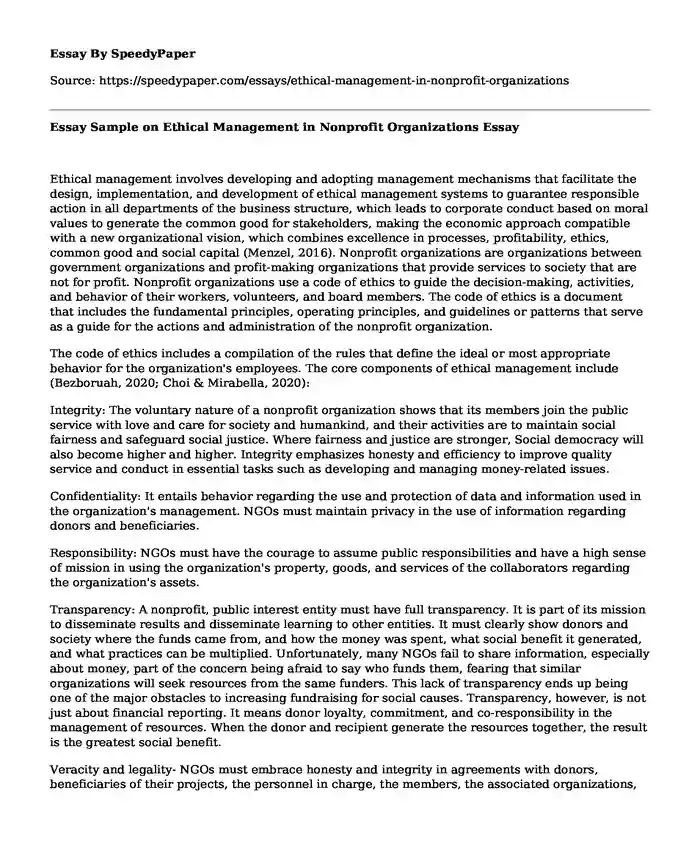
| Type of paper: | Essay |
| Categories: | Management Ethics Organizational culture |
| Pages: | 3 |
| Wordcount: | 734 words |
Ethical management involves developing and adopting management mechanisms that facilitate the design, implementation, and development of ethical management systems to guarantee responsible action in all departments of the business structure, which leads to corporate conduct based on moral values to generate the common good for stakeholders, making the economic approach compatible with a new organizational vision, which combines excellence in processes, profitability, ethics, common good and social capital (Menzel, 2016). Nonprofit organizations are organizations between government organizations and profit-making organizations that provide services to society that are not for profit. Nonprofit organizations use a code of ethics to guide the decision-making, activities, and behavior of their workers, volunteers, and board members. The code of ethics is a document that includes the fundamental principles, operating principles, and guidelines or patterns that serve as a guide for the actions and administration of the nonprofit organization.
The code of ethics includes a compilation of the rules that define the ideal or most appropriate behavior for the organization's employees. The core components of ethical management include (Bezboruah, 2020; Choi & Mirabella, 2020):
Integrity: The voluntary nature of a nonprofit organization shows that its members join the public service with love and care for society and humankind, and their activities are to maintain social fairness and safeguard social justice. Where fairness and justice are stronger, Social democracy will also become higher and higher. Integrity emphasizes honesty and efficiency to improve quality service and conduct in essential tasks such as developing and managing money-related issues.
Confidentiality: It entails behavior regarding the use and protection of data and information used in the organization's management. NGOs must maintain privacy in the use of information regarding donors and beneficiaries.
Responsibility: NGOs must have the courage to assume public responsibilities and have a high sense of mission in using the organization's property, goods, and services of the collaborators regarding the organization's assets.
Transparency: A nonprofit, public interest entity must have full transparency. It is part of its mission to disseminate results and disseminate learning to other entities. It must clearly show donors and society where the funds came from, and how the money was spent, what social benefit it generated, and what practices can be multiplied. Unfortunately, many NGOs fail to share information, especially about money, part of the concern being afraid to say who funds them, fearing that similar organizations will seek resources from the same funders. This lack of transparency ends up being one of the major obstacles to increasing fundraising for social causes. Transparency, however, is not just about financial reporting. It means donor loyalty, commitment, and co-responsibility in the management of resources. When the donor and recipient generate the resources together, the result is the greatest social benefit.
Veracity and legality- NGOs must embrace honesty and integrity in agreements with donors, beneficiaries of their projects, the personnel in charge, the members, the associated organizations, the government, and the general public. There should also be respect concerning the laws of any jurisdiction in which it operates.
Conclusion
At present, globally, there are operational and practical instruments to manage ethics, both internally and externally, of public or private organizations to promote conduct in accordance with morality and ethical decisions. This allows organizations to move towards the conjunction of the economic approach of maximizing profitability, with the ethical-humanistic vision, which provides the basis for developing corporate humanism and long-term business sustainability. An ethical NGO is that which builds its profitability project within a network of relationships founded on the basis of justice, equity, respect, and transparency, proposing with the organization itself and with the products themselves to improve people's quality of life, in addition to socializing a part of the wealth produced, to contribute to the growth of the society in which it operates, generating the greatest possible well-being for all those related. Through a code of conduct, NGOs are provided an ethical framework shared by the entities and by the people involved in their actions and be the starting point for the consensus of ethical principles and values based on identity and culture.
References
Bezboruah, K. C. (2020). Ethics and accountability in nonprofit management curriculum. In Teaching Nonprofit Management. Edward Elgar Publishing. https://www.elgaronline.com/view/edcoll/9781788118668/9781788118668.00010.xml
Choi, K., & Mirabella, R. (2020). Values, virtues, and nonprofit ethics. The Routledge Companion to Nonprofit Management.
Menzel, D. C. (2016). Ethics management for public and nonprofit managers: Leading and building organizations of integrity. Routledge.
Cite this page
Essay Sample on Ethical Management in Nonprofit Organizations. (2023, Nov 24). Retrieved from https://speedypaper.net/essays/ethical-management-in-nonprofit-organizations
Request Removal
If you are the original author of this essay and no longer wish to have it published on the SpeedyPaper website, please click below to request its removal:
- Free Essay Example on Multicultural Education
- Challenges Facing Firms, Essay Sample in Strategic Management
- Essay Sample Describing the Importance of Diversity in Children's Literature
- Essay Sample on Decontamination Principles
- Essay Sample on Progress, Results, and Finalizing the HR Project
- Essay Sample on The Roles That a Manager within an Organization
- Navigating Workplace Conflict: Strategies and Styles - Free Essay Example
Popular categories




